
Salman Rushdie
The following novels constitute the shortlist for the 1981 Booker Prize:
Notable Omissions from the 1981 Shortlist

|
Midnight's Children Salman Rushdie |
Quotes:
"The literary map of India is about to be redrawn...Midnight's Children sounds like a continent
finding its voice. An author to welcome to world company" - New York Times
"I haven't been so continuously surprised by a novel since I read One Hundred Years of Solitude" - The Times
"Will surely be recognised as a great tour de force, a dazzling exhibition of the gifts of a new
writer of courage" - Anita Desai, Washington Post
"India has found her GŁnter Grass" - Sunday Telegraph
"Huge, vital, engrossing ... in all sense a fantastic book" - Sunday Times
"A marvellous epic book ... a brilliant new aspirant to the rank of V.S. Naipual and Milan Kundera" - Newsweek
"A magnificent book and Salman Rushdie is a major novelist" - Observer
"There isn't another piece of Indo-Anglian writing quite like it - a sort of Bombay-based World According to Garp ...
it is in fictional terms one of the most ferocious indictments of India's evolution since Independence" - India Today
"India has produced a glittering novelist - one with startling imaginative and intellectual resources, a master
of perpetual storytelling" - V.S. Pritchett, New Yorker
"A brilliant and endearing novel, the latest of India's many contributions to English fiction, and the most remarkable of
them all" - London Review of Books
"One of the most important novels to come out of the English-speaking world in this generation" - New York Review of Books
First Paragraph:
I was born in the city of Bombay...once upon a time. No, that won't do, there's no getting away from the date: I was born in Doctor Narlikar's Nursing Home on August 15th, 1947. And the time? The time matters, too. Well then: at night. No, it's important to be more...On the stroke of midnight, as a matter of fact. Clock-hands joined palms in respectful greeting as I came. Oh, spell it out, spell it out: at the precise instant of India's arrival at independence, I tumbled forth into the world. There were gasps. And, outside the window, firewords and crowds. A few seconds later, my father broke his big toe; but his accident was a mere trifle when set beside what had befallen me in that benighted moment, because thanks to the occult tyrannies of those blandly saluting clocks I had been mysteriously handcuffed to history, my destinies indissolubly chained to those of my country. For the next three decades, there was to be no escape. Soothsayers had prophesised me, newpapers celebrated my arrival, politicos ratified my authenticity. I was left entirely without a say in the matter. I, Saleem Sinai, later variously called Snotnose, Stainface, Baldy, Sniffer, Buddha and even Piece-of-the-Moon, had become heavily embroiled in Fate - at the best of times a dangerous sort of involvement. And I couldn't even wipe my own nose at the time.
From the Picador paperback edition, 1984.
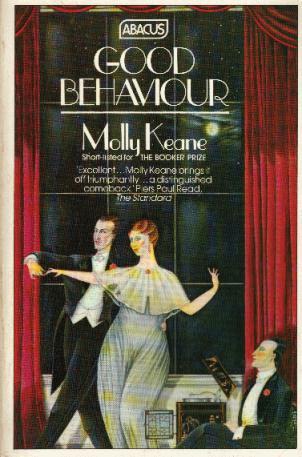
|
Good Behaviour Molly Keane |
Dustjacket synopsis:
"'I do know how to behave - believe me, because I know. I have always known...'.
"Behind the gates of Temple Alice the aristocratic Anglo-Irish St Charles family sinks into a state of decaying grace. To Aroon St Charles, large and unlovely daughter of the house, the fierce forces of sex, money, jealousy and love seem locked out by the ritual patterns of good behaviour. But crumbling codes of conduct cannot hope to save the members of the St Charles family from their own unruly and inadmissable desires.
"This elegant and allusive novel coming after years of silence establishes Molly Keane as the natural successor to Jean Rhys."
Quotes:
"Excellent...Molly Keane brings it off triumphantly...a distinguished comeback." - Piers Paul Read, The Standard
"An extraodinary tour de force of fictional presentation...a masterpiece...a technically
remarkable work, as sharp as a blade...Molly Keane is a mistress of wicked comedy." - Malcolm Bradbury, Vogue
"This self-possessed, crispy detailed and alertly funny novel is a wonder. Silent for decades,
Keane has abruptly produced a maserpiece." - Newsweek
"A witty, black comedy of manners, Good Behaviour is a memorable novel by an Irish writer
whose only equal is Elizabeth Bowen." - The Bookseller
"May well become a classic among Engish novels." - Rachel Billington, New York Times Book Review
"Fine new novel, wickedly alive." - Victoria Glendinning, Sunday Times
"Enchanting." - Edna O'Brien, Observer
First Paragraph:
Rose smelt the air, considering what she smelt; a miasma of unspoken criticism and disparagement fogged the distance between us. I knew she ached to censure my cooking, but through the years I have subdued her. Those wide shoulders and swinging hips were once parts of a winged quality she had - a quality reduced and corrected now, I am glad to say.
"I wonder are you wise, Miss Aroon, to give her rabbit?"
"And why not?" I can use the tone of voice which keeps people in their places and usually silences any interferences from Rose. Not this time.
From the Abacus paperback edition, 1981.
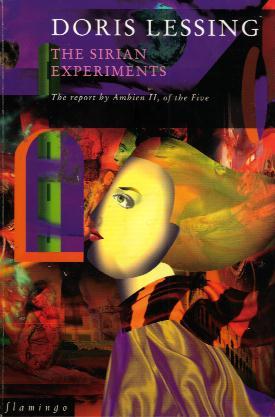
|
The Sirian Experiments Doris Lessing |
Dustjacket synopsis:
"Shortlisted for the 1981 Booker prize, The Sirian Expriements is the third volume in Doris Lessing's celebrated
space fiction series, 'Canopus in Argos: Archives'. In this interlinked quintet of novels, she creates a new, extraordinary
cosmos where the fate of the Earth is influenced by the rivalries and interactions of three powerful galactic empires,
Canopus, Sirius and their enemy, Puttiora. Blending myth, fable and allegory, Doris Lessing's astonishing visionary
creation both reflects and redefines the history of our own world from its earliest beginnings to an inevitable,
tragic self-destruction.
"The Sirian Expriements chronicles the origins of our planet, as the three galactic empires fight for control of the human race. The novel charts the gradual moral awakening of its narrator, Ambien II, a 'dry, dutiful, efficient' female Sirian administrator. Witnessing the wanton colonisation of land and people, Ambien begins to question her involvement in such insidious experimentation, her faith in the possibility of human progress itself growing weaker every day."
Quotes:
"The story Ambien tells is a panorama of the possibiities of civilisation and barbarism, ranging from a matriachal
version of Atlantis to the Aztec cult of human sacrifice. Doris Lessing's interests are strictly terrestrial and the
figures from outer space are there to serve as tellers of an earthly tale, providing a new, sometimes startling,
perspective on earthly affairs and a largeness of vision beyond the horizon of the conventional novel." -
Robert Alter, New York Times
"One of our greatest contemporary writers...Doris Lessing has invented a new cosmology to look at the world in a new way:
she is attempting to tackle nothing less than all human life on Earth." - Financial Times
First Paragraph:
This is Ambien II, of the Five.
I have undertaken to write an account of our experiments on Rohanda, known to Canopus in this epoch as Shikasta.
I shall employ the time divisions commonly used, and agreed on between ourselves and Canopus. (1) The period up to the first burst of radiation from Andar. (2) That between the first and second bursts of radiation - again from Andar. (3) From the second irradiation to the failure of the Canopus-Rohanda Lock, known as the Catastrophe. This third period is sometimes referred to as the Golden Age. (4) The period of subsequent decline. This account of mine will deal mainly with (4).
I shall not do more than mention the experiments before the first radiation, which are fully documented under Lower Zoology. During (1) Rohanda was damp, marshy, warm, with shallow seas hardly to be distinguished from swamp, and deep oceans kept turbid by volcanic activity. There was a little dry land. On this were a few land animals, but there were numerous varieties of water lizards, and many fishes. Some of these were unknown on other Colonized Planets, and on our Mother Planet, and we made successful transfers of several species. We also introduced on to Rohanda species from elsewhere, to see what would happen to them. All our experiments during (1) were modest, and did not differ from similar experiments in other parts of our Empire.
From the Flamingo paperback edition, 1994
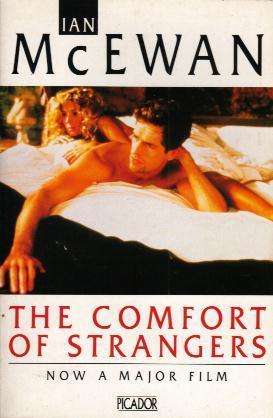
|
The Comfort of Strangers Ian McEwan |
Quotes:
"McEwan, the master of the taciturn macabre, so organises his narrative that, without
insisting anything, every turn and glimpse is another tightening of the noose. The evils of
power and the power of evil are transmitted with a steely coolness, and in a prose that has
a feline grace" - Anthony Thwaite, Observer
"His story has you in its strangehold from first page to last. Ian McEwan has honed his prose
style (always admirably spare) to tell his tale, and with all the skill of an accomplished
torturer, he throws the occasional crumbs of comfort, as the tension becomes unbearable, only to
snatch them away within moments" - Angela Huth, The Listener
"As always, McEwan manages his own idiom with remarkable grace and inventiveness; his characters
are at home in their dreams and so is he" - Frank Kermode, The Guardian
"As the best young writer on this island, McEwan's evocations of feeling and place and his
analyses of mood and relationship remain haunting and compelling" - Andrew Sinclair, The Times
First Paragraph:
Each afternoon, when the whole city beyond the dark green shutters of their hotel windows began to stir, Colin and Mary were woken by the methodical chipping of steel tools against the iron barges which moored by the hotel cafe pontoon. In the morning these rusting, pitted hulks, with no visible cargo or means of propulsion, would be gone; towards the end of each day they reappeared, and their crews set to inexplicably with their mallets and chisels. It was at this time, in the clouded, late afternoon heat, that customers began to gather on the pontoon to eat ice cream at the tin tables, and their voices too filled the darkened hotel room, rising and falling in waves of laughter and dissent, flooding the brief silences between each piercing blow of the hammers.
From the Picador paperback edition, 1981.
Notes:
This novel was adapted into a film in 1990. The film was directed by Paul Schrader from a screenplay
by Harold Pinter, and featured Christopher Walken, Rupert Everett, Natasha Richardson and Helen
Mirren.

|
Rhine Journey Ann Schlee |
Dustjacket synopsis:
"It is the summer of 1851, and during a gloriously romantic journey down the Rhine
by paddle steamer, one woman's imagination is stretched almost to breaking point.
"Charlotte is the unmarried sister of the Reverend Charles Morrison with whose family she is travelling. As they board the boat, she suddenly mistakes a passenger for the man she gave up years ago, at her brother's insistence. And that that moment, this extraordinarily evocative novel creates an aura of romantic, erotic tension that is as compelling as it is mysterious. Charlotte's inner passion is brilliantly balanced by the stifling manners of the time, as she is drawn inexorably towards confrontation with the passenger, and herself."
Quotes:
"Rhine Journey has a crystal clear quality that quite fascinated me. The
quality of the writing is so extraordinarily high that I could hardly believe it
was a first novel" - Margaret Foster
"A journey down the Rhine in the company of Ann Schlee is the purest, simplest
pleasure" - Sunday Telegraph
"A marvellous book" - Observer
"Stunning" - The Times
First Paragraph:
'The luggage has simply been left on the deck,' said the Reverence Charles Morrison. 'I had, thought, Charlotte, that you were with it.'
Charlotte, his sister for whose summer excursion (the fact suffused her at this moment) he had generously paid, said, 'Surely you didn't ask me.'
'Was it necessary to ask? I assumed that when you went off by yourself on to the deck it was to check on the luggage, knowing as you did that I was otherwise occupied.'
From the Pan paperback edition, 1996.
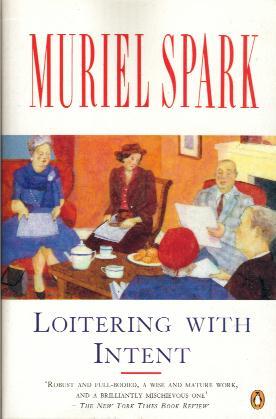
|
Loitering with Intent Muriel Spark |
Dustjacket synopsis:
"When Fleur Talbot takes up work for the snobbish Sir Quentin Oliver and the venal members of his Autobiographical
Assocaiation she is secretly delighted. Here is inspiration for her novel Warrender Chase. But when Sir Quentin
steals the finished manuscript for his own lunatic ends, life begins to imitate art with uncanny - and dangerous -
predictability - for more than one of her characters has met an untimely end..."
Quotes:
"Robust and full-bodied, a wise and mature work, and a brilliantly mischievous one" - The New York Times Book Review
"Positively glistens with intelligence...a delicious conundrum" - New Statesman & Society
"Gloriously entertaining" - A.N. Wilson, Spectator
First Paragraph:
One day in the middle of the twentieth century I sat in an old graveyard which had not yet been demolished, in the Kensington area of London, when a young policeman stepped off the path and came over to me. He was shy and smiling, he might have been coming over the grass to ask me for a game of tennis. He only wanted to know what I was doing but plainly he didn't like to ask. I told him I was writing a poem, and offered him a sandwich which he refused as he had just had his dinner himself. He stopped to talk awhile, then he said good-bye, the graves must be very old, and that he wished me good luck and that it was nice to speak to somebody.
This was the last day of a whole chunk of my life but I didn't know that at the time. I sat on the stone slab of some Victorian grave writing my poem as long as the sun lasted. I lived nearby in a bed-sitting-room with a gas fire and a gas ring operated by pre-decimal pennies and shillings in the slot, whichever you preferred or had. My morale was high. I needed a job, but that, which should have been a depressing factor when viewed in cold blood, in fact simply was not. Neither was the swinishness of my landlord, a Mr Alexander, short of stature. I was reluctant to go home lest he should waylay me. I owed him no rent but he kept on insisting that I should take a larger and more expensive room in his house, seeing that I had overcrowded the small single room with my books, my papers, my boxes and bags, my food stores and the evidence of constant visitors who stayed to tea or came late.
From the Penguin paperback edition, 1995.
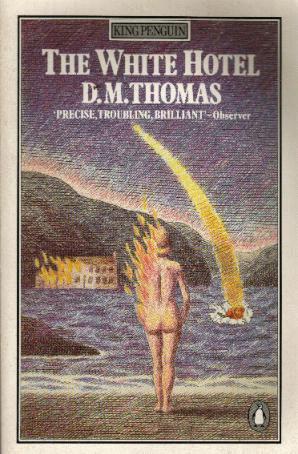
|
White Hotel D.M. Thomas |
Dustjacket synopsis:
"The White Hotel is an extraordinary, daring colossus of a work in which is seen a startling poetry of
violence and redemption. Fugue and threnody, it interlaces history, lush sexuality, psychological truth,
fantasy and the craving for brutality, in the case-history of Lisa Erdman, a patient of Freud's. And
travelling through the intricate patterns of her being, the reader is sent on an odyssey that seeks refuge beyond
the nightmare of the twentieth century."
Quotes:
"Precise, troubling, brilliant" - Observer
"This novel is a reminder that fiction can amaze" - Time
"A major artist has once more appeared...the prose remains calm and precise but achieves...such dreadful intensity
that I could hardly bring myself to read it to the end" - Spectator
"To describe this novel as spine-tingling in its indescribable poetic effect would be to rivialize its profoundly
tragic theme. Say then that it is heart-stunning" - The New York Times
First Paragraph:
Standish Hotel,
Worcester, Massachusetts, U.S.A.
8 September 1909
Dearest Gisela,
I give you a warm bear-hug from the new world! What with the journey, the hospitality, the lectures, the
honours (mostly to Freud naturally and, to a lesser extent, Jung), there has hardly been time to blow one's nose, and my
mind is in a whirl. But it's already more than clear that America is eager to receive our ovement. Brill and Hall are
excellent fellows, and everyone at Clark University has overwhelmed us with kindness and compliments. Freud astonished
even me with his masterly skill, by delivering five lectures without any notes - composing them during a half-hour's walk
beforehand in my company. Jung also gave two fine lectures, about his own work, without once mentioning Freud's name!
Though on the whole the three of us have got on splendidly together, in rather trying circumstances (including, I may
say, attacks of diarrhoea in New York...!) there has been a little tension between Jung and Freud. Of that, more
in a moment.
From the King Penguin paperback edition, 1983.
Notable Omissions from the Shortlist:
"Lanark", Alisdair Gray
"Who was Oswald Fish?", A.N. Wilson
This page and its contents are copyright © 2002 by Perry Middlemiss, Melbourne, Victoria, Australia.
Last modified: April 16, 2002.